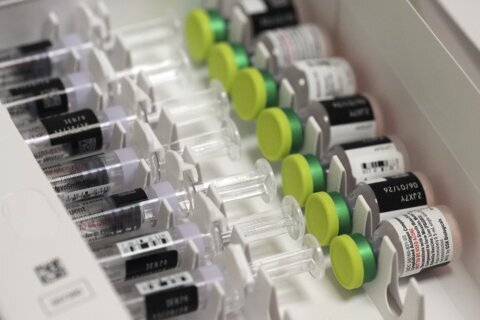This article was republished with permission from WTOP’s news partners at Maryland Matters. Sign up for Maryland Matters’ free email subscription today.
This content was republished with permission from WTOP’s news partners at Maryland Matters. Sign up for Maryland Matters’ free email subscription today.
Two scientists from Maryland — including a groundbreaking AIDS researcher — are pursuing government funding for a study to determine whether the vaccine used against polio could offer temporary protection against COVID-19.
In a paper published this month in the journal Science, Drs. Robert C. Gallo and Shyam Kottilil suggest that the oral polio vaccine could provide several weeks of protection against the virus, or at least reduce the morbidity rate for those who get infected.
In the paper, Gallo and Kottilil suggest the oral polio vaccine, developed in the 1950’s, could provide temporary protection against COVID-19 or at the very least, greatly reduce morbidity.
The vaccine uses a live virus that’s altered to reduce its risk. The researchers believe that live attenuated virus vaccines like the one developed to fight polio can induce broad protection from pathogens by activating innate immunity mechanisms in the body.
“We think you could get a significant edge on things. You could have protection for some period of time,” Gallo said during an online Q&A with University of Maryland Baltimore interim President Dr. Bruce E. Jarrell on Monday. “You could give it again. And you could give it again.”
While the polio vaccine may not be the “silver bullet” that protects against COVID-19 permanently, it could buy time while the global scramble to find and test a vaccine advances.
The two men were scheduled to meet with NIH officials on Monday afternoon to discuss their proposal to conduct an ambitious human trial with 11,000 subjects, half of whom would get the vaccine, half a placebo.
Researchers would then track their subjects to see how many got COVID-19, how severe their symptoms were, and whether they developed antibodies.
“As the epidemic is moving from one place to another, it’s extremely challenging to design this study,” Kottilil conceded. “This study would be centered [at the University of Maryland] Baltimore but there are other sites which would join based on the prevalence of transmission of coronavirus at that time.”
The polio vaccine has several advantages, Gallo and Kottilil said. It’s been around a long time, is known to be safe, and it’s easy and inexpensive to produce, around $0.15 per treatment.
The transmission of polio to people who get the vaccine is virtually nonexistent and may be zero, Gallo added.
“The advance of OPV [oral polio vaccine] is that there’s an enormous history of millions and millions of people — actually billions — that have had this, so you have an enormous track record and safety profile,” said Gallo. “You can’t get better than that.”
The Global Virus Network has already begun to stockpile OPV in anticipation of their research moving forward.
Gallo is Director of the Institute of Human Virology at the University of Maryland School of Medicine and Co-Founder & International Scientific Advisor of the Global Virus Network.
Kottilil is a professor of medicine, director of IHV’s Clinical Care and Research Division, and a member of the Global Virus Network.







